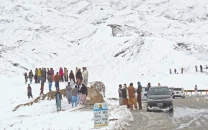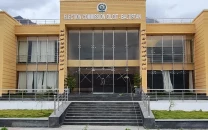Uncertain future: Job insecurity plagues 340 contractual employees in G-B
G-B Assembly passed resolution last year recommending regularising Population Welfare department employees.

The lack of job opportunities in the private sector, coupled with an unfriendly business environment, convinced many residents of G-B to opt for government jobs.CREATIVE COMMONS
Khurshid Alam, 45, has served for more than 10 years in the Population Welfare department in Gilgit-Baltistan (G-B), but his service is yet to be regularised.
“I get a meagre salary from my job,” said Alam, who is the sole breadwinner in his family. “But I am fully aware that my future is not secure; neither is that of my children.”
The lack of job opportunities in the private sector, coupled with an unfriendly business environment, convinced many residents of G-B to opt for government jobs.
Alam says contract employees in G-B are not interested if the government is short of funds or plagued by corruption or mismanagement. “What they do know is that life will be very tough without a job in this mountainous region of nearly 1.5 million people – majority of whom are struggling on or below the poverty line,” he said. Daily price hikes, he adds, do not help.
“The idea of being jobless is very bothersome. It keeps me under constant mental stress,” said the government worker desolately. “I am a contract employee, after all, and can be fired at any time.”
Since Alam has already crossed the age limit required for induction in a permanent government post, he says he spends most of his time wondering how he will support his family in the coming days if he is shown the door. Moreover, he is not alone; 344 others in Alam’s department also face the same plight.
In a bid to help these employees, the G-B Assembly moved a resolution last year recommending the regularisation of the Population Welfare department employees. However, that route might also have hit a dead end.
“The issue of regularising services is linked with the budget,” says Minister for Excise and Taxation Muhammad Naseer. “The G-B Assembly has nevertheless passed a resolution to this effect, and the issue will hopefully be settled.”
An alternative source of livelihood for residents is the tourism industry. However, this sector has been on a steady decline in the region since a highly publicised terrorist attack in June 2013 when armed men attacked a base camp near Nanga Parbat and killed 10 foreign tourists.
G-B has made considerable progress on the political front, especially in the wake of the introduction of Empowerment and Self-Governance Order 2009. The region was made a quasi-province, with the chief minister and governor running most affairs and providing quicker and easier solutions. Many like Alam, however, feel that issues like unemployment and corruption may strongly hinder that progress.
Published in The Express Tribune, May 18th, 2014.


















COMMENTS
Comments are moderated and generally will be posted if they are on-topic and not abusive.
For more information, please see our Comments FAQ